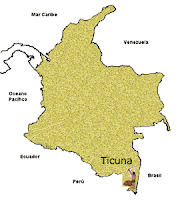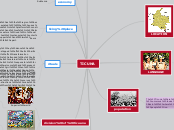TICUNA
The Ticuna conceive the natural world as a whole, where man is part of the plants, of the trees, of the mountain animals and of the "beings of the water"


LOCATION
They are located south of the Amazon on the Cotuhé River

LANGUAGE
The linguistic family is independent, with Tupi roots.

population
The Ticuna are one of the most numerous towns in the Amazon Basin, where approximately 7,102 people live.
economy
Subtema
living place
Over time and as the region became more populated, the houses were transformed into platform construction, pillars and roofs in Palma Caraná
the Ticuna ancestors lived in oval Malocas, with rectangular center, vertical supports and two doors They were far apart.
rituals
During the party they dance and the girl is stripped of her hair as a symbol of transformation
The orientation is attended by her mother and her maternal uncle, while the father is responsible for organizing a welcome and presentation party. The girl, then, is adorned with facial and body paint, dressed in yanchama and her head adorned with a feathered headband.
Isolation of girls during their first menstruation, in a closed room separated from the family unit. After being isolated, she receives the mythical instructions to make her transformation from a girl to an adult woman
division of ticuana

Superior world
in the first, men similar to human beings live; in the second they inhabit the souls of the dead with Tae, a mythological being; and in the third they inhabit the vulture kings
Lower World
Conformed by all the aquatic part. There live demons and strange humans full of defects (blind, dwarves, people without anus).

Intermediate World
It is the surface of the earth, inhabited by men and some demons.

culture
before they were men they were fish until their father Yoi took them out of the waters, using as bait pieces of cassava
In their rituals the "fiesta de pelazón" stands out, made to mark the passage to adulthood of young Ticuna.
